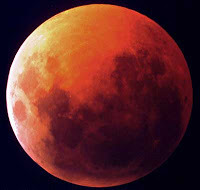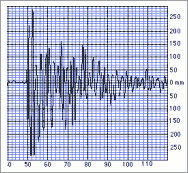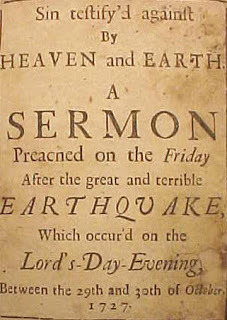The great New England quake of 1638
© Christy K. Robinson
The Hutchinsonians (followers of Anne Hutchinson's religiousfaction) had been in Portsmouth, Rhode Island, for about a monthafter having been exiled from Massachusetts Bay Colony. On Tuesday, June 1, 1638, at2:00 pm, when New England was enjoying a lovely, sunny day, an earthquake struckNew Hampshire, Massachusetts,Connecticut, and Rhode Island. The epicenter was in New Hampshire, and of about 6.5 - 7.0 magnitude,according to modern seismologists, based on its duration of four minutes. There was a large aftershock about 30 minutesafter the main shock, and many more tremors before the earth stilled aboutthree weeks later—just in time for a full eclipse of the moon, which showeditself a dried-blood color.

The moon turning to blood is another apocalyptic sign. Revelation 6:12 describes the end-times that the Puritans believed were upon them, "and, lo, there was a great earthquake; and the sun became black as sackcloth of hair, and the moon became as blood." Another prophecy of the end was in Acts of the Apostles 2:20: "The sun shall be turned into darkness, and the moon into blood, before the great and notable day of the Lord come." The fully-eclipsed blood moon was observed in Rhode Island. (Can you guess by whom? There was only the one settlement, at Portsmouth! Providence Plantation was on mainlaind, not on Aquidneck/Aquiday Island, later called Rhode Island.)
 The hand of God (right) animates Adam.
The hand of God (right) animates Adam.Earthquakes and other natural phenomena (comets, eclipses,great storms, famines, epidemics, plagues of pests) were considered to bedirect messages from the hand of God, to display his displeasure at humansinfulness. In the case of the 1638 earthquake, those recording the historybelieved they were of God's Elect (people set apart to be saved from wrath and hell), so the message must be for someone else—the"someones" who followed Anne Hutchinson in exile to Rhode Island, that's who! (Between 50 and 75families, including William and Mary Dyer.) The "someones" who had defied Massachusetts Bay laws to speak and believe as God ledthem, instead of conforming to the theocratic, autocratic government there. The"someones" who, after repeated "loving demonstrations" of their error, hadrefused to recant. Well, then, bring on the judgment for those damned heretics!
We have a very good idea of what Anne Hutchinson and MaryDyer were doing at the time of the earthquake, thanks to Gov. John Winthrop,who tells us that they were having a prayer meeting, as they'd done for severalyears in Boston.When the quake struck (no doubt amplified by the marshes and liquefied soil ofthe island, but causing no permanent damage because the settlers were housed in wigwams while building their homes), the Hutchinsonians were convinced that just as on the Day ofPentecost, 50 days after Christ's resurrection, they were being blessed andhonored by the descent of the Holy Spirit, giving them spiritual gifts inconfirmation that they were firmly set in God's will.
Perception of curse or blessing depends on where you stand.
There are several contemporary descriptions of the event.
William Bradford was the governor of the Pilgrims'Plymouth Colony, Massachusetts.William Bradford, Morison Edition, Chapter29, pp. 302-303: This year, about the first or second of June,was a great and fearful earthquake. It was in this place heard before it wasfelt. It came with a rumbling noise or low murmur, like unto remote thunder. Itcame from the northward and passed southward; as the noise approached nearer,the earth began to shake and came at length with that violence as causedplatters, dishes and suchlike things as stood upon shelves, to clatter and falldown. Yea, persons were afraid of the houses themselves. It so fell out that atthe same time divers of the chief of this town were met together at one house,conferring with some of their friends that were upon their removal from theplace, as if the Lord would hereby show the signs of His displeasure, in theirshaking a-pieces and removals one from the other. However, it was very terriblefor the time, and as the men were talking in the house, some women and otherswere without the doors, and the earth shook with that violence as they couldnot stand without catching hold of the posts and pales that stood next to them.And about half an hour or less came another noise and shaking, but neither soloud or strong as the former, but quickly passed over so it ceased. It was notonly on the seacoast, but the Indians felt it within land, and some ships thatwere upon the coast were shaken by it."
 Seismograph of 7.0 quake
Seismograph of 7.0 quake Governor John Winthrop of Massachusetts Bay Colony, who hadbeen extremely ill and nearly died during the month of May, recorded in hisjournal:
--June 1. Between three and four in the afternoon, being clear, warm weather, the wind westerly, there was a great earthquake. It came with a noise like a continued thunder or the rattling of coaches in London, but was presently gone. It was at Connecticut, at Narragansett, at Pascataquack, and all the parts round about. It shook the ships, which rode in the harbor, and all the islands, etc. The noise and the shakings continued about four minutes. The earth was unquiet twenty days after, by times.
Winthrop also recorded a hearsay account of the earthquake in Rhode Island. He may have receivedinformation from Dr. John Clarke, or seen a letter from William Hutchinson toRev. John Cotton. Winthropwrote in April 1639:"On the first of June 1638, there was anearthquake which continued about four minutes and left the earth in an unquietcondition for twenty days afterwards. Mrs. Hutchinson and some of her adherentshappened to be at prayer when the earthquake was at Aquiday [Portsmouth, RhodeIsland], etc., and the house being shaken thereby, they were persuaded, (and boastedof it,) that the Holy Ghost did shake it in coming down upon them, as he didupon the apostles" [at Pentecost. Easter had been on April 12, so Pentecost wouldhave been on June 1—not that anyone but Catholics celebrated the church festivals at that time!]
Letter from Rev. Roger Williams of Providence, Rhode IslandFor his MuchHonored Mr. Governor, John Winthrop.Providence, [June, 1638.] SIR,—Isometimes fear that my lines are as thick and over busy as the musketoes,&c., but your wisdom will connive, and your love will cover, &c. Twothings at present for information. First in the affairs of the MostHigh; his late dreadful voice and hand: that audible and sensible voice, theEarthquake. All these parts felt it, (whether beyond the Narragansett Iyet learn not), for myself I scarce perceived ought but a kind of thunder and agentle moving, &c., and yet it was no more this way to many of our own andthe natives' apprehensions, and but one sudden short motion. The youngernatives are ignorant of the like: but the elder inform me that this is thefifth within these four score years in the land: the first about three scoreand ten years since [1568]: the second some three score and four years since[1574], the third some fifty-four years since [1584], the fourth some forty-sixsince [1592]: and they always observed either plague or pox or some otherepidemical disease followed; three, four or five years after the Earthquake,(or Naunaumemoauke, as they speak). He be mercifully pleased himself tointerpret and open his own riddles, (and grant if it be pleasing in his eyes)it may not be for destruction, and but (as the Earthquake before the Jailor'sconversion) a means of shaking and turning of all hearts, (which are his,)English or Indian, to him. To further this (if the Lord please) the Earthquakesensibly took about a thousand of the natives in a most solemn meeting forplay, &c. ROGER WILLIAMS.
 1727 quake sermon shows connection between heaven and earth
1727 quake sermon shows connection between heaven and earthWonder-working providence of SionsSaviour in New England, Volume 2By Rev. Edward Johnson Chap. XII.OF the great Earthquake in New England, and of the wosnll end of some erroniouspersons, with the first foundation of Harverd Colledge. This yeare, the first day of the Fourth Month[June], about two of the clock in the after-noone, the Lord caus'd a great andterrible Earth-quake, which was generall throughout all the EnglishPlantations; the motion of the Earth was such, that it caused divers men (thathad never knowne an Earth-quake before) being at worke in the Fields, to castdowne their working tooles, and run with gastly terrified lookes, to the nextcompany they could meet withall; it came from the Westerne and uninhabitedparts of this Wildemesse…
Travels in New England and New-York By Timothy Dwight, 1822There are eight earthquakes recorded in the historyof New England. The first of them was on the 1st day of June, 1638, and is styled byDr. Trumbull, "a great and memorable earthquake." His account of itis the following:—" It came with a report like continued thunder, or therattling of numerous coaches upon a paved street. The shock was so great, thatin many places the tops of the chimnies were thrown down, and the pewter fellfrom the shelves. It shook the waters and ships in the harbours, and all theadjacent islands. The duration of the sound and tremor was about four minutes.The earth at turns was unquiet for nearly twenty days. The weather was clear,the wind westerly, and the course of the earthquake from west to east."
SpecialPublication No. 149DEPARTMENT OF COMMERCE, U. S. COAST AND GEODETIC SURVEYE. LESTER JONES.DIRECTOREARTHQUAKE HISTORY OF THE UNITED STATES, Exclusiveof the Pacific RegionBY N. H. HECK1638. June1 or 3.This seems to have been quite a violent shock. At Plymouth, Mass.,people had to hold on to objects to keep from falling. Ships at sea wereshaken. It was felt in Connecticutand at Narragansett.
For moreinformation on New England earthquakes, click HERE .
Published on September 07, 2011 01:10
No comments have been added yet.



